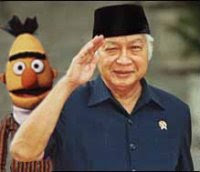33 attacks on worshipping Christians in Indonesia
Well, last Sunday I resolved to join the worshippers from Bekasi's HKBP church and their sympathisers as they raised their voices in protest up at Monas. HKBP is the church that has been turfed out of its place of worship and forced into a local field, which must make a kneeling in prayer a rather soggy affair. Not content with this humiliation however, those lovable rogues from the FPI (Islamic Defenders Front) launched an all-out attack on these poor Christians three weeks ago, hospitalising a number of them in the process.
Up at Monas, several hundred worshippers had gathered. Alas, they were hemmed into a small area on the south side of the park by the police and were not allowed to head north to the Presidential Palace, where earlier I had seen rehearsals for Independence Day in full militaristic swing, neat rows of polished epaulettes goose-stepping to some funky brass band boogie.
No, the worshippers had to content themselves with gathering around a small truck on which a Christian youth was launching into a classically Indonesian amplified diatribe, bewailing the plight of happy clappers in the good old R of I. The young orator was flanked by two members of an organisation called the PMKRI, a catholic student group apparently. These two chaps sported purple berets with yellow pom-poms on the top making them look, to my eyes at least, like a cross between Black Panther style militants and a couple of camp sippers of crème de menthe.
"Where are you SBY?!” our Christian Malcolm X censured his president. The silence has indeed been deafening as Indonesians, both Christian and Muslim, wait for some moral leadership from the kleptomaniacal carpetbaggers that rule the roost. The wheels have most definitely fallen off the Yudhoyono bandwagon over the last 12 months that's for sure.
I parleyed with some of the demonstrators, who were all sporting red ribbons around their arms as a show of solidarity. "We used to have Gus Dur and Nurcolish, but now there seems to be nobody committed to religious peace. It wasn't like this when I was a child," one woman told me. An elderly gentleman, perhaps getting nearer to the truth, explained to me that, "This tension has been under the surface for 40 years in Indonesia, but now it's out in the open."
There then followed a rousing a really quite emotional chorus of the Indonesian National anthem, as the protesters reaffirmed their Indonesian identities and the spirit of pluralism that this diverse, archipelagic nation was founded upon. The singing was passionate and committed, although not so much at the back where I was standing, but perhaps I was in the Jewish section.
I glanced over my shoulder and noted with a snigger that, viewed from this part of the park, the bulging dome of the Istiqlal mosque sits at the bottom of the main Monas phallus in exactly the position that you would expect to find something similarly spherical. I wondered if this smutty little tableau was a forewarning of Indonesia's future, a future in which minority religions are given the shaft as a new Islamic nationalist paradigm establishes itself and goes on a testosterone fuelled rampage.
I noticed a girl in a jilbab wearing a rucksack towards the rear of the demo. “Perhaps she's getting ready to press the detonator button,” I thought to myself, and then felt shocked that such an idea would pop into my head. How could I think such a thing about friendly old Indonesia? But it was too late to chastise myself, the thought had been there.
Where will the country’s descent into religious demagoguery lead if left unchecked? To its ultimate break-up and Balkanisation? Islamic orthodoxy (orthos: right, doxa: opinions) is an approach to the great religion that seeks to end debate and replace it with a set of rules and prescriptions to be followed. Debate and argument are, in this formulation of religion, now seen as an insult to the faith itself and close to heresy. To the extent that the modern ayatollahs and mullahs are informing the world that the last word is in on how the Koran should be understood, I would submit that they are being treasonous to the good book itself.
What the great religions require of their followers are intelligent engagement and interpretive agility. The teachings are inevitably in the form of metaphors, symbols, analogies and parables. You can't get at transcendent truth by pointing at things and issuing Fatwas. You do it by telling stories and by engaging people in the dance and drama of the dialogue.
Islam came after Christianity and thus guaranteed that this long debate would be revived. There was now more than one book, more than one set of prophecies, more than one prophet. Now, however, many of faith would seek to end debate rather than encourage it and we've turned full circle once again. Where is the spirit of merdeka?








